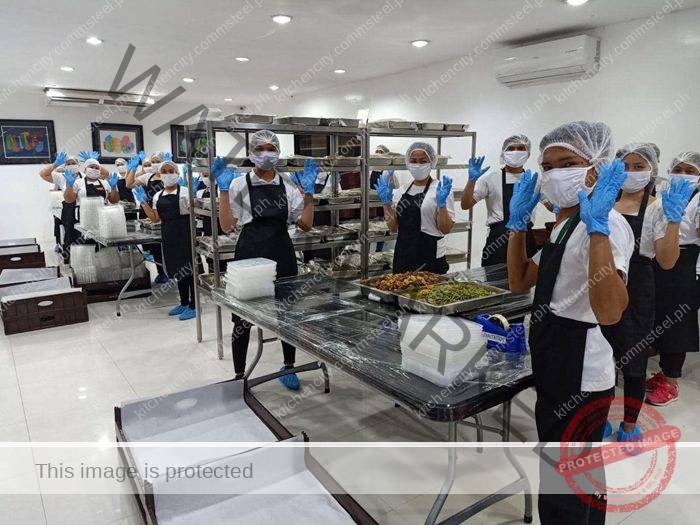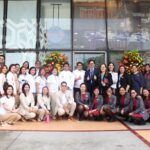A food catering company in Taguig City has reinvented its operations amid the pandemic to keep the business afloat and provide income to thousands of employees.
“The pandemic hit all industries and the food industry is not spared. In the food industry, the hardest hit are the dine-in restaurants. So many continue to be closed, and when they open, revenues are just a fraction of what it once was before. People are not anymore going around. The behavior has shifted to home-office-home. For our company, our pivots to new business models have been received warmly by our market,” says Peejay Yambao, president and chief executive of Kitchen City.
Kitchen City, which Yambao and Jun Abelardo established in 2011, is now one of the largest contract catering companies in the Philippines that caters to institutions, call centers, hospitals, manufacturing plants, hotels and schools.
The Food Kitchen commissary is situated at Food Terminal Inc. in Taguig, with about 4,000 square meters that includes a fixed asset warehouse, freezer storage, butchering area, cooking area, packing area and administration office. The facility is compliant with the food safety protocols such as Hazard analysis and Critical Control Points and Good Manufacturing Practices.
The company employs more than 2,300 individuals. Yambao says it is important that the business remains operational to keep them employed through the global health crisis.
“You can just imagine that these families are all relying on us to make the right decisions on how to move the company forward,” Yambao says in an e-mail interview.
Yambao, who graduated from Ateneo de Manila University with BS in Management Engineering in 1999 and worked for Procter & Gamble in Singapore before establishing his distribution company and venturing into the food industry, says Kitchen City’s business began to transform just before the Luzon-wide lockdown.
Abelardo says that based on the experience of other countries when they were in lockdown which allowed only groceries, drugstores and food delivery to operate, “we had to pivot our business to food delivery to remain relevant.”
“We operate over 100 cafeterias and employ more than 1,000. Most of the cafeterias were closed for three months. We had to change business models to generate revenues so that we can keep employing our people,” Yambao says.
“We have been fortunate that our change in business model yielded better than expected results,” Abelardo says.
Yambao says that to keep their canteens open, “we shifted the model to packed meals instead of the normal canteen set-up to reduce interaction.”
“We also heavily marketed our packed meals to corporations as their ‘Covid support’ to their employees who continue to work during the ECQ. On top of that, we also marketed our packed meals for donations to hospitals and frontliners,” he says.
Yambao says that this being not enough to sustain the business, they went direct to consumers via the launch of Kitchen City Family Frozen Meals.

“We launched it on March 17, immediately after the announcement of the lockdown. So far, our changes have yielded good results enough to continue employing our people. In the future, we have bigger plans ahead in our direct to consumer campaign,” he says.
Yambao believes that while food is staple, many of the food companies will close once landlords start charging rent.
“The ones that survive are the ones that have evolved and have invested into the right model. For us, we expect our canteens to open and play a greater part in the sustenance of the employees,” he says.
Yambao says the heavy investments they made in food safety protocols have helped them to meet higher expectations during the pandemic. “We use leading edge technology. That’s why the biggest companies trust us as their food provider. It is also the reason why the biggest contract catering company in the world, Compass Group, chose us to be their Philippine partner,” he says.
Yambao, a father of three, says the lockdown has not only transformed his business, but also made his family closer to one another. “I have a beautiful wife, a hard working son and two lovable daughters. It feels great knowing everything that’s happening to them every day. The lockdown made us closer. It improved my health as well. I exercise every day,” he says.
Yambao remains optimistic about the future of Kitchen City, given their customer-centric approach and their concern for their employees.
“The joys of being an entrepreneur are firstly, the dynamism of changing and seeing the results of your actions; secondly, the happy faces of employees who you continue to employ regardless of the situation and lastly and more importantly, the flexible time it provides so that I can be in the special events of my family,” he says.
Yambao encourages other entrepreneurs to remain hopeful. “Overall, with the current scenario, survival is already a victory. Continue changing, continue evolving just to keep yourself afloat. When things settle down, the model you have in place that made you survive, will be the model that will reap you rewards later on,” he says.
Kitchen City delivers frozen versions of 60 choices from their signature dishes such as beef caldereta, kare kare, roast beef, salpicao, sisig, dinuguan, paksiw, adobo, curry, fish fillet, salmon and tuna dishes, laing, tofu dishes and desserts in Metro Manila, Rizal, Laguna and Cavite. It is also opening delivery hubs in Bulacan and other areas.





